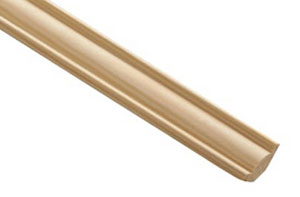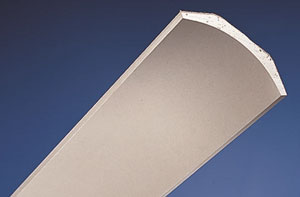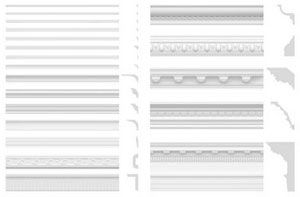Clay Cross Coving Installation (S45): If the sharp lines between ceiling and wall surfaces are something you hate you might want to look at softening them with the use of coving and decorative mouldings. Whether the use of coving is in or out of fashion these days is hard to figure as it seems to come in and out of favour, however it's still used to embellish many a home in Clay Cross. Of course whether or not you decide to have coving fitted in your property is down to personal choice. For most, it is the choice between sharp, modern lines or smooth, classic transitions.
What is Coving? - Coving is a curved, decorative moulding, which is used to hide the 90 degree angled created where ceilings meet walls within a structure. You might be surprised to learn that decorative mouldings and coving can be made from several different materials, the most common of which are gyproc, paper covered plaster, plastic, MDF, duropolymer, timber, extruded PVC, polyurethane and high-density polystyrene.

All these materials and a baffling choice of designs and shapes as well, like ovolo, cavetto, cyma recta, step, Victorian, dentil, egg and dart, ogee (or cyma reversa), Edwardian and art deco.
Coving can provide the perfect finishing touch to a room's interior design, bringing a subtle yet striking effect. A curved coving shape can seamlessly blend the junction between ceilings and walls, creating an elegant look for your home. But, with so many materials and patterns to choose from, selecting the right coving for your property can be overwhelming. When picking coving, it's essential to factor in both your personal preferences and the decor of your home. For optimal results, it's essential to make sure that coving installation is completed to the highest possible standard.
All these options can make it difficult to make a decision about precisely what it is you want. A specialist Clay Cross coving installer should be able to assist you in making some of these decisions. It is always better to get a bit of specialist help when you want to achieve a quality coved finish on your Clay Cross home.
While completely new coving installations may be the forte of your local Clay Cross coving installation specialist, they will normally also take on repair and refurbishment projects. As well as caring for the other decorative features of your home, cornices and covings need some tender loving care once in a while. This could be necessary for coving, picture rails, corbels, plaques, dado corners, panel mouldings, ceiling roses, cornices, dado rails or fire surrounds.

Coving work and the installation of decorative mouldings is often done by plasterers, joiners (where wood mouldings are involved), painters and decorators, and specialist coving fitters in Clay Cross, when available. Before you actually employ anybody it really is sensible to check into their level of experience in this kind of work. In order to get a quality finish, the coving work must be done carefully and meticulously because this is painstaking work.

When you are considering estimates, you shouldn't simply go for the cheapest coving fitter in Clay Cross. You do not want to be paying for sloppy workmanship at any price, cheap is not always best! If you take a little care and time over picking the right tradesperson, it is likely that your coved room will look gorgeous when it is done.
In an effort to obtain a coving fitter or plasterer in Clay Cross you can use a trade review websites such as Rated People or Local Heroes, you can visit the Federation of Master Builders (FMB) website and use their search facility for vetted and approved plasterers in Clay Cross, you could have a look in local classified ads or newspapers or you could check out Instagram or Facebook. You're able to find coving related products like coving cutting tools, coving adhesive, ceiling roses, pre-cut coving corners and coving packs by going to Wickes, Coving Direct, Jewson or B&Q, and you are able to buy tools and equipment for coving and plastering (if you fancy tackling it yourself) by browsing the websites of Screwfix, Artex or Tool Station.
Coving installation can be carried out in Clay Cross and also in: Pilsley, Alton, New Tupton, Old Tupton, Ashover, Stretton, Woodthorpe Grange, Hepthorne Lane, Northedge, Holmewood, Danesmoor, Church Hill, North Wingfield, Lower Pilsley, and in these postcodes S45 9LH, S45 9QQ, S45 9HX, S45 9AD, S45 9DR, S45 9LE, S45 9HE, S45 9PS, S45 9FR, and S45 9QJ. Locally based Clay Cross coving specialists will most likely have the dialling code 01246 and the postcode S45. Checking this will guarantee you access locally based coving fitters. Clay Cross home and business owners are able to utilise these and various other related services. Click the "Quote" banner to make enquiries and obtain coving installation price quotes.
What is the Difference Between Cornice and Coving?
A source of endless bewilderment to people in Clay Cross, and a question that we are commonly asked is "What's the difference between coving and cornice?" The answer to this question is that they are basically the same thing. The principal distinction, if you have to draw one, is that cornices are exceptionally elaborate, while covings are comparatively simple in their design. In Clay Cross in the post-world war period, the expression coving was initially used for a basic "C" shaped concave moulding that was very fashionable at the time. In comparison, cornices sometimes call for expertise of a master craftsman in Clay Cross, if they're to be put up successfully, as they're usually, though not always, exceedingly ornate mouldings.
Plaster Coving
Plaster coving is a traditional method of decorative moulding. It requires two people with experience and a high level of expertise to install it correctly. Plaster coving is one of the oldest ways to decorate walls in Clay Cross. It is made from lime and gypsum that are consolidated with hessian fibre. Once dried, this material hardens into a smooth, solid stone. This material is often used to install ceiling roses and coving.
Before installing plaster coving, plan and mark its layout. The length of each piece should match the length of the adjacent wall or ceiling. The length of the coving should be as precise as possible, and each piece should be level. You can then trim the pieces to eliminate gaps. Then, apply a thin layer of adhesive to the join where one piece of coving meets the next. This should guarantee a strong bond and prevent cracks in the future.
Plaster coving is a decorative plasterwork element that ties the walls and ceiling together. It is typically fixed in the wall-to-ceiling joint and can be used in recessed ceilings, lighting troughs and coiffured ceilings. It is available in a variety of sizes and period designs and is highly fire-resistant. (Tags: Plaster Coving Fitters Clay Cross, Plaster Coving Clay Cross, Plaster Coving Installation Clay Cross, Plaster Coving Installers Clay Cross)
Wooden Coving Clay Cross
Wooden coving, installed at the junction of the wall and ceiling, brings an elegant touch to any room. From contemporary to classic, it is designed in various styles and finishes to accommodate different tastes and interior designs. Wooden coving not only enhances the aesthetic appeal of your home in Clay Cross but also hides any unattractive joints or imperfections where the ceiling and wall connect.

For timber coving to fit seamlessly and look professional, skill and precision in installation are required. The procedure includes measuring the room, cutting the coving to the correct size, and fixing it in position with nails and adhesive. Ensuring that the coving matches your existing design scheme may require you to carefully sand and then stain or paint it. Although some do-it-yourselfers may attempt this task on their own, employing professional installers guarantees a perfect result.
Avoid the hassle of fitting wooden coving with professional installation services. Experienced installers bring the necessary expertise and tools to complete the job effectively and to a high standard of workmanship. They manage the entire process, from the initial consultation and measurement to the finishing touches, ensuring your home benefits from beautifully finished coving that enhances its character. Opting for professional installation not only saves you valuable time but also guarantees that the coving is both visually appealing and durable. (Wooden Coving Clay Cross).
Do-it-Yourself Coving

It's on no account impossible for you to have a go at installing coving by yourself. Coving can be bought online or from home improvement stores in the Clay Cross area. Coving is normally supplied in 2 or 3 metre lengths, and you can also buy the corners ready cut for some designs, making life somewhat simpler.
Needless to say that there is lots of info on the internet offering tips on how to fit coving, together with descriptive tutorials and videos to help you as you go. We recently found this informative post which may be useful.
Gyproc Coving Clay Cross
The junction between ceilings and walls in Clay Cross can be enhanced by Gyproc coving, a versatile decorative feature. Made from preformed plasterboard, it comes in a variety of sizes and designs to suit different types of rooms. This type of coving can be installed to add a touch of elegance to any space, creating a smooth transition from ceiling to wall and concealing any unsightly cracks or imperfections.

Installing it is a fairly straightforward process. The coving pieces are cut to the room's dimensions and subsequently secured in position with a special adhesive. To achieve a neat, tidy finish, gaps and joints are filled and sanded smooth. Gyproc coving is an attainable do-it-yourself project for property owners aiming to improve the aesthetics of their interiors without the requirement for major refurbishments.
The installation of Gyproc coving also offers several practical benefits. It can cover cracks that may appear over time at the ceiling-wall junction, providing a longer-lasting, cleaner look. To allow for further personalisation, coving can be painted to either match or contrast with the decorative features of the room. To enhance the functionality and beauty of a room, Gyproc coving is a simple and effective option. (Gyproc Coving Clay Cross)
Plaster Cornice Refurbishment
Maintaining the visual appeal of a building's interior involves essential plaster cornice refurbishment. Damage to cornices, the decorative molding located at the juncture of walls and ceilings, can occur due to various factors like moisture, general wear and tear or accidental impact.
Repairing a plaster cornice requires the expertise of a skilled craftsman who can carefully assess the extent of the damage and devise a suitable restoration plan. To repair a plaster cornice, one must typically clean the affected area, remove any damaged or loose plaster, and fill the gaps with new plaster. Replicating intricate patterns or designs to match the original design is a crucial skill possessed by skilled tradespeople repairing a cornice.
Failure to repair damaged cornices can lead to its further deterioration and impact the safety and structural integrity of the building. Seeking professional help for any plaster cornice repair work is essential. Preservation of the historical integrity of a property, especially in listed buildings where original features are crucial, is aided by a well-maintained cornice that enhances the building's visual appearance.
Archways and Alcoves Clay Cross
Long celebrated in the world of architecture and interior design as ageless elements that can transform a space from average to astounding, bespoke alcoves and archways. Architectural features like these, can be both visually appealing and serve practical purposes. For example, they can define areas within a room, provide storage solutions, or simply add a touch of charm and elegance. Why bespoke alcoves and archways continue to be cherished elements in interior design, let's delve into their world and discover.

Bespoke Archways: Archways, architectural wonders that have graced buildings for hundreds of years, date back to ancient civilizations such as the Romans. Today, bespoke archways are making a significant impact on modern interior design in Clay Cross. Various styles of tailor-made arches are available, from the more modern, minimalist designs to the classic Roman arch.
A key advantage of custom archways is their ability to create a sense of flow and transition between spaces, which is one of their most notable features. Connecting different rooms, they maintain a feeling of separation while creating an open and inviting atmosphere. Additionally, archways can serve as focal points, drawing attention to particular areas or architectural elements within a room, adding to their versatility. Bespoke archways, whether crafted from plaster, stone or wood, can be tailored to complement the overall aesthetic of your space, adding character and sophistication, making them a versatile and stylish addition to any home.
Alcoves: An alcove, a recessed space in a wall, can serve various different purposes. For centuries, these charming niches have served as artwork displays, bookcases, and comfy reading corners. Homeowners in Clay Cross can personalise bespoke alcoves to meet their specific needs and preferences, taking this concept to the next level.
The Perfect Marriage: The integration of bespoke alcoves and archways can lead to a harmonious and visually stunning interior. The presence of a tailor-made archway opening into a room with a skillfully designed alcove can generate a dramatic and anticipatory atmosphere. As a frame for the alcove, the archway not only highlights its contents but also infuses additional depth into the overall design.
To summarise, beyond being mere architectural elements, bespoke alcoves and archways are declarations of design and craftsmanship. Infusing a space with character, elegance, and practicality, they wield the power to transform. Bespoke archways and alcoves serve as timeless design choices for anyone looking to set up a cosy nook for reading, display art, or simply bring a classic beauty to their property, ensuring these enhancements will enrich your living space in a multitude of ways. (78087 - Alcoves and Archways Clay Cross)
Clay Cross Coving Related Tasks

Clay Cross coving specialists will likely help with PVC coving, cornice coving, timber coving, egg and dart coving, Victorian coving, quotes for coving installation, the installation of Victorian coving, living room coving installations, the installation of cornices, Victorian cornices in Clay Cross, decorative cornicing, coving refurbishment, ornate corbels, polyurethane coving in Clay Cross, cutting coving mitres, picture rails, ornamental arches in Clay Cross, contemporary coving, cheap coving installation, coving repairs in Clay Cross, duropolymer coving, the installation of polystyrene coving, ceiling restoration, plaster cornice repairs, the installation of Edwardian coving, Georgian coving, bedroom coving, cornices, coving restoration, wooden cornices and other coving related work in the Clay Cross area. Listed are just a handful of the tasks that are undertaken by local coving fitters. Clay Cross providers will tell you about their whole range of services.
Coving Installers Near Clay Cross
Also find: North Wingfield coving installers, Northedge coving installers, Danesmoor coving installers, Holmewood coving installers, Alton coving installers, Lower Pilsley coving installers, New Tupton coving installers, Ashover coving installers, Stretton coving installers, Woodthorpe Grange coving installers, Pilsley coving installers, Old Tupton coving installers, Hepthorne Lane coving installers, Church Hill coving installers and more. There are people who install coving in pretty much all of these localities. The expertise, brought by these seasoned craftsmen, ensures precise and professional coving installation in your property. By choosing a professional for this task, property owners can rest assured that the coving will be fitted correctly, contributing to the overall character and beauty of their homes. Local residents can obtain coving installation estimates by going here.
Clay Cross Coving Services
- Coving Installation
- Wooden Coving
- Ceiling Rose Installation
- Ornamental Mouldings
- Cheap Coving
- Coving Services
- Coving Removal
- Coving Designs
- Polyurethane Coving
- Egg and Dart Coving
- Cornice Installation
- Coving Fitting
- Coving Repairs
- Coving Suppliers

More Clay Cross Tradespeople: Obviously, whenever you are doing home remodeling in Clay Cross, you will probably need all types of different tradesmen and apart from a coving fitter in Clay Cross, you could also need a window fitter in Clay Cross, a plasterer in Clay Cross, a renderer in Clay Cross, waste removal in Clay Cross, a locksmith in Clay Cross, a wallpapering specialist in Clay Cross, a bricklayer in Clay Cross, a painter and decorator in Clay Cross, a carpenter/joiner in Clay Cross, an electrician in Clay Cross, an odd job man in Clay Cross, a security alarm installer in Clay Cross, cornicing in Clay Cross, and other different Clay Cross tradesmen.
 Coving Installation Clay Cross
Coving Installation Clay Cross Coving Installers Near Clay Cross
Coving Installers Near Clay Cross Coving Fitters Clay Cross
Coving Fitters Clay CrossFor the best local info relating to Clay Cross, Derbyshire click here
More: Lightweight Coving, Plastic Coving, Polyurethane Coving, Coving, Duropolymer Coving, Duropolymer Coving, Lightweight Coving, Cheap Coving Fitters, Coving Installers, Cornice Fitters, Coving Installation, Plastic Coving, Polyurethane Coving, Plastic Coving, Wooden Coving, Plaster Coving, Cornice Fitters, Wooden Coving, Duropolymer Coving, Cornice Fitters, Lightweight Coving, Lightweight Coving, Plastic Coving, Gyproc Coving, Polyurethane Coving, Cornice Fitters, Cornices and Coving, Lightweight Coving, Coving Services, Cornice Fitters, Cornices and Coving, Coving Fitters, Cornices and Coving, Polyurethane Coving, Cornices and Coving, Residential Plastering, Cheap Plastering, Plaster Patching, Cheap Plastering, Internal Plastering.
Coving fitters S45 area, phone code 01246.
TOP - Coving Installation Clay Cross
Coving Specialists Clay Cross - Coving Repairs Clay Cross - Cheap Coving Clay Cross - Coving Installers Clay Cross - Ceiling Rose Installation Clay Cross - Cornices Clay Cross - Coving Fitters Near Me - Dado Rails and Mouldings Clay Cross - Coving Fitters Clay Cross




